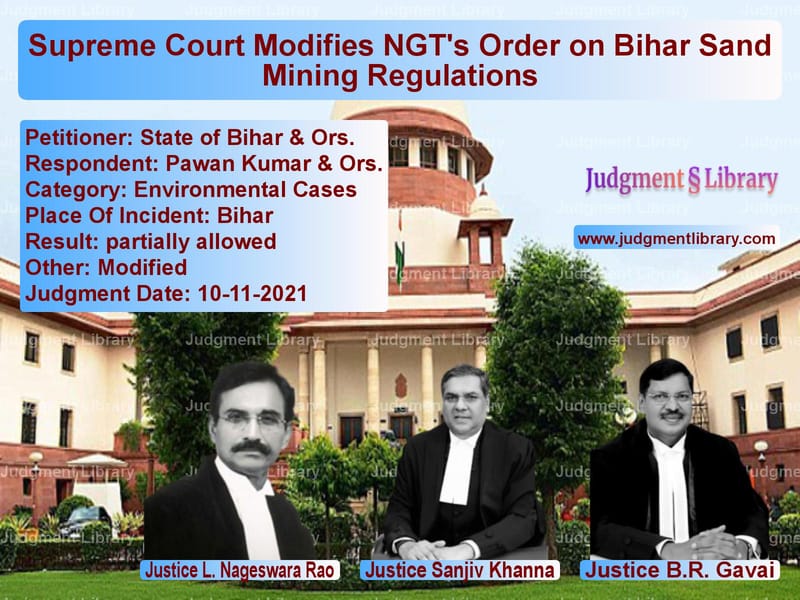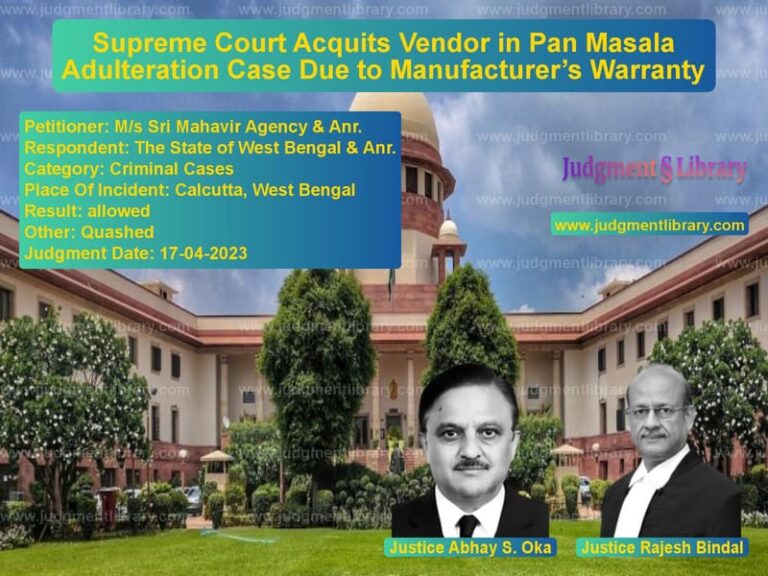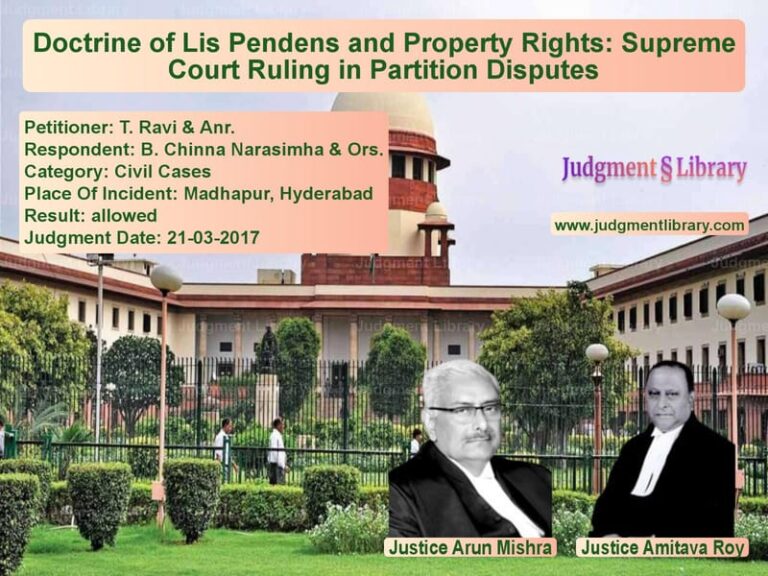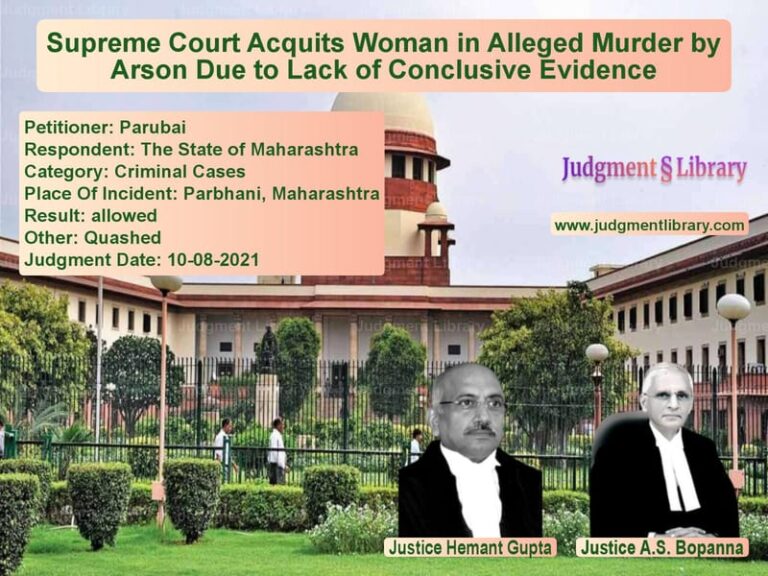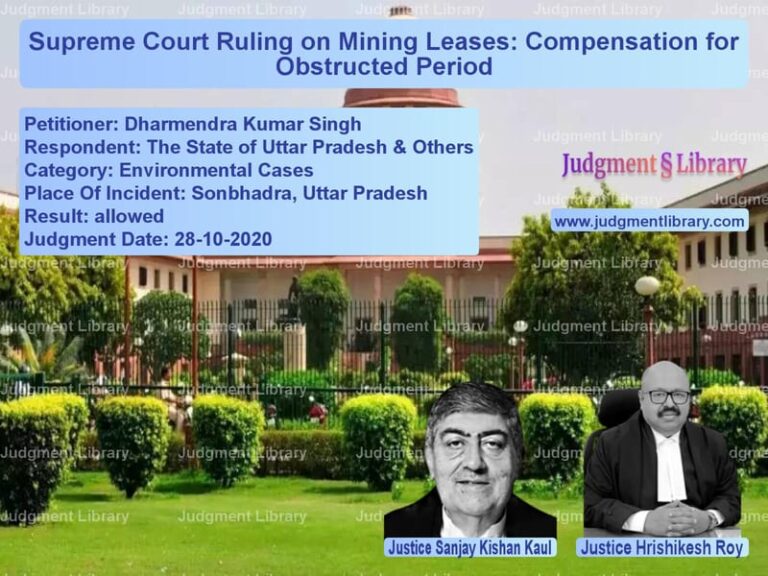Supreme Court Modifies NGT’s Order on Bihar Sand Mining Regulations
The case of State of Bihar & Ors. v. Pawan Kumar & Ors. revolved around the legality and regulatory framework governing sand mining in Bihar. The Supreme Court partially set aside the National Green Tribunal (NGT)’s directions, modifying the process for preparing District Survey Reports (DSRs) for mining activities. The ruling underscores the balance between environmental protection and economic development.
The Supreme Court, in its decision, acknowledged the importance of regulating sand mining but also recognized the adverse effects of an outright ban, such as the rise of illegal mining and loss of revenue to the public exchequer. The judgment highlights the necessity of ensuring that environmental laws are followed while allowing regulated mining operations to continue.
Background of the Case
The dispute originated when the NGT passed an order on October 14, 2020, in O.A. No. 40/2020/EZ and O.A. No. 57/2020/EZ, directing the State of Bihar to undertake fresh preparation of District Survey Reports (DSRs) before granting mining leases. The NGT mandated that the preparation of DSRs should involve agencies accredited by the National Accreditation Board of Education and Training (NABET) and the Quality Council of India.
The Bihar government challenged this order, arguing that the NGT had overstepped its jurisdiction by imposing additional conditions not required under the existing environmental laws.
Arguments by the Petitioner
The State of Bihar, represented by Senior Counsel Shri Atmaram Nadkarni, contended:
- The NGT’s order was contrary to the established procedures under the Environmental Impact Assessment (EIA) Notification of 2016.
- The preparation of DSRs should be done by government-appointed committees rather than private consultants.
- The requirement for approval from the State Expert Appraisal Committee (SEAC) and the State Environmental Impact Assessment Authority (SEIAA) before finalizing the DSRs was unnecessary and not mandated by law.
- The delays caused by the NGT’s ruling were affecting infrastructure development and leading to illegal sand mining activities.
Arguments by the Respondent
Pawan Kumar and other respondents, represented by Senior Counsel Shri P.S. Patwalia, opposed the appeal, arguing:
- The NGT’s directions were necessary to prevent unregulated sand mining that causes severe environmental damage.
- The Bihar government had not followed the prescribed scientific methods for preparing DSRs.
- The requirement for SEAC and SEIAA approval was essential to ensure that environmental concerns were properly addressed.
- The past failure of the Bihar government to regulate sand mining led to ecological destruction and riverbed degradation.
Supreme Court’s Judgment
The Supreme Court, comprising Justices L. Nageswara Rao, Sanjiv Khanna, and B.R. Gavai, modified the NGT’s order while ensuring that the environmental concerns were addressed.
“Though developmental activities are not stalled, the environmental issues are also required to be addressed. A balanced approach of sustainable development ensuring environmental safeguards needs to be resorted to.”
The Court recognized the need to curb illegal mining while allowing regulated operations. It issued modified directions:
- The DSRs shall be prepared by government-appointed sub-divisional committees consisting of officers from the Revenue Department, Irrigation Department, State Pollution Control Board, Forest Department, and Geological/Mining Department.
- The committees must conduct site visits and use modern technology, including drones and satellite imaging, to identify potential mining sites.
- The finalized DSRs must be approved by SEAC and SEIAA within six weeks of submission.
- Until the DSRs are finalized, the Bihar State Mining Corporation is permitted to carry out mining operations using contractors while ensuring environmental protection measures are in place.
The Supreme Court set a timeline of 20 weeks for the finalization of DSRs and instructed the State of Bihar to comply strictly with environmental laws.
Conclusion
This ruling strikes a balance between environmental protection and economic needs. It ensures that sand mining is conducted in a regulated manner while preventing illegal activities that harm the ecosystem. The decision sets a precedent for other states grappling with similar issues of balancing development and environmental sustainability.
Petitioner Name: State of Bihar & Ors..Respondent Name: Pawan Kumar & Ors..Judgment By: Justice L. Nageswara Rao, Justice Sanjiv Khanna, Justice B.R. Gavai.Place Of Incident: Bihar.Judgment Date: 10-11-2021.
Don’t miss out on the full details! Download the complete judgment in PDF format below and gain valuable insights instantly!
Download Judgment: state-of-bihar-&-ors-vs-pawan-kumar-&-ors.-supreme-court-of-india-judgment-dated-10-11-2021.pdf
Directly Download Judgment: Directly download this Judgment
See all petitions in Environmental Cases
See all petitions in Public Interest Litigation
See all petitions in Judgment by L. Nageswara Rao
See all petitions in Judgment by Sanjiv Khanna
See all petitions in Judgment by B R Gavai
See all petitions in partially allowed
See all petitions in Modified
See all petitions in supreme court of India judgments November 2021
See all petitions in 2021 judgments
See all posts in Environmental Cases Category
See all allowed petitions in Environmental Cases Category
See all Dismissed petitions in Environmental Cases Category
See all partially allowed petitions in Environmental Cases Category

